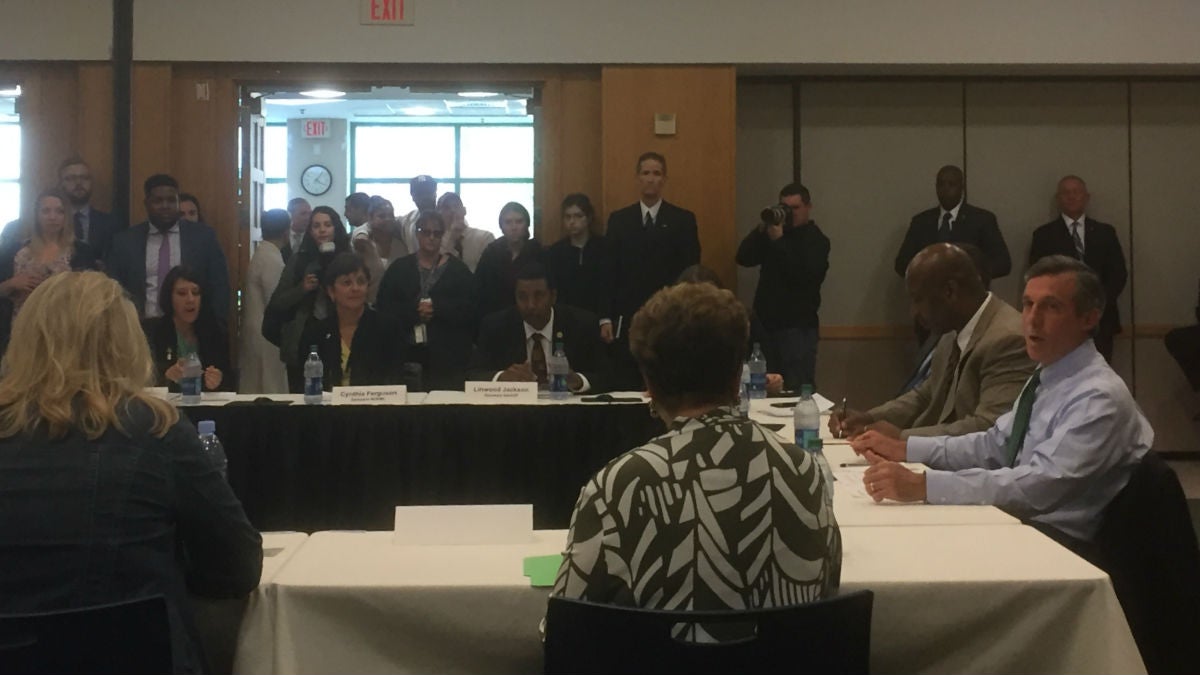Gov. Carney hosts round table discussion on marijuana legalization

Delaware Gov. John Carney hosts a community meeting with advocates hoping to legalize marijuana in the First State. (Zoë Read/WHYY)
Gov. John Carney hosted a marijuana legalization town hall discussion Wednesday.
Green shirts, ties and dresses were the fashion items of choice for dozens of men and women who packed into a conference room at Delaware Technical Community College in Wilmington Wednesday night.
More than 100 Delawareans attended a round table discussion hosted by Gov. John Carney, D-Delaware, to discuss the potential benefits of legalizing cannabis.
“What I’m trying to do here is to do the right thing for the state,” he said. “I want Delaware to be a better state, and I want to keep your perspective in mind as we think about this issue.”
The First State allows medical cannabis and has decriminalized marijuana for possession of an ounce or less.
Delaware could be the 9th state to approve recreational use for those over 21 if pending legislation introduced by State Sen. Margaret Rose Henry, D-Wilmington, and State Rep. Helene Keeley, D-Wilmington, passes this year.
The law as written would regulate and tax cannabis much like alcohol. Individuals would be prohibited from operating a vehicle under the influence, carrying it across state borders and growing or creating products on their own, and companies would still be allowed to drug test employees.
Throughout his campaign, Carney said while in favor of medical cannabis, he wasn’t on board with full legalization. However, he said he hosted the event with Henry, Keeley, and advocates to listen to those who are in support.
Despite sporting a well-received green tie for the event, Carney said he hasn’t changed his mind—but that he’s open minded.
“The purpose of the town hall was to listen to different points of view. It was a good opportunity to hear from folks on the pro-legalization side. I want to hear the other side [too],” he said.
“I think generally we should take it slowly and learn from other states. There are things we can really learn from the negative experience and unintended consequences in other states. If we’re going to do this we ought to do it with our eyes wide open, and we ought to do it in a way that addresses some of the serious potential problems that exist.”
Advocates for legalization say cannabis is significantly safer than alcohol and tobacco, has medical benefits, creates jobs and boosts the economy. Legalization in Delaware also would bring in an estimated $22 million in taxable revenue, advocates say.
They say criminalizing marijuana is just as ineffective as alcohol prohibition was, creates a dangerous illicit market, and causes unnecessary arrests of non-violent criminals.
“A criminal record can have a lifelong effect on an adolescent that otherwise has no criminal history,” said Delaware NAACP leader Linwood Jackson during the event.
Statistics also show blacks are more likely to be arrested for marijuana possession than whites.
“A lot of people are in jail for low level drug crimes who don’t belong there,” Sen. Henry said. “By legalizing we won’t be arresting so many people unnecessarily.”
Several attendants, like Hector Ortiz from Wyoming, voiced support for legalization during public comment. He told the Governor cannabis helped him overcome cancer.
“Everyone should have the human right to uses cannabis legally. We are not criminals unless the law makes us criminals,” Ortiz said. “Cannabis should not be in the hands of real criminals in the black market. Someone is going to sell it, Governor. I would rather it be the State of Delaware.”
Aaron Appling, a pastor at Victory Church in Dover, said being arrested for a quarter ounce of marijuana when he was 19 almost destroyed his life. He said he and many members of his congregation are hard-working charitable individuals who happen to use recreational cannabis.
“I believe the war on cannabis is an enemy to the poor, and the sooner we end prohibition the sooner they can be free from criminalization,” Appling said.
“A lot of people are ignorant because they’ve been lied to for so long, they don’t want to accept the truth. I think it’s time we step up and admit what we’ve done in the past is wrong, and it’s drastically affecting those in our communities.”
While most attendants showed support for legalization, some expressed apprehension, voicing concern that individuals would still shop on the black market because it’s cheaper.
In response to the round table, AAA also released a statement of opposition to legalization, citing concern about driving under the influence, an inability to measure impairment and challenges for law enforcement, courts, state agencies and public health.
“We urge our legislators to understand the costly implications of legalization, which would have significant ramifications for societal use, increasing the number of people who use it and get behind the wheel and drive. That would put all of us at more risk on the road,” said Cathy Rossi, Vice President of Public and Government Affairs for AAA Mid-Atlantic.
“We also know from other states that legalization creates a new costly infrastructure, burdens health care providers, social services, law enforcement, courts and first responders. For whatever marijuana might raise in revenue, its legalization comes at high cost to society and safety, producing new threats on our roads. AAA Mid-Atlantic is strongly opposing the commercialization of marijuana for recreational purposes.”
Carney said he’ll host another round table to discuss those concerns with the other side.
Zoë Patchell of the Cannabis Bureau of Delaware said she hopes Carney will study research that shows marijuana is safer than alcohol and tobacco.
“This industry exists with or without legalization and right now it’s in the hands of the violent criminal illicit market,” she said. “We need to get it out of the hands of the criminal market and allow it to benefit the state by taxing and regulating like alcohol for folks 21 and older.”
Keeley said she believes more people are in support of legalization as people become educated about cannabis—in fact, a University of Delaware study showed 61 percent of residents are in favor of legalization.
“I’m happy the Governor has agreed to schedule a meeting with people who aren’t in agreement, because I think he needs to hear from them as well,” she said.
“In the end, the Governor will be the ultimate decision maker. I’m still very hopeful it will pass in the House in the coming weeks we go back. The more education we can offer people, with the majority of reports that are positive about the legalization of cannabis, I think the Governor will come to the conclusion it’s the right thing to do.”
WHYY is your source for fact-based, in-depth journalism and information. As a nonprofit organization, we rely on financial support from readers like you. Please give today.





